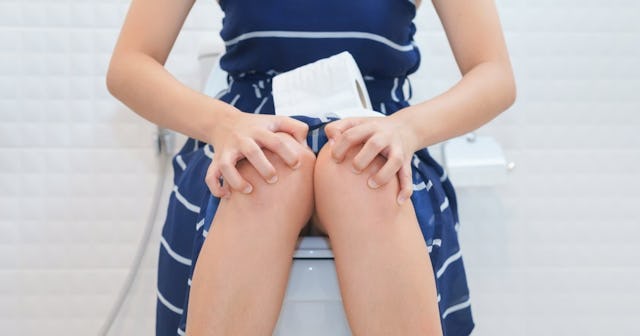Homemade Pregnancy Tests Are Surprisingly Popular, But Do They Even Work?

We get it: you’re anxious to know if you’re pregnant. And if you’ve been trying for a while, those at-home pregnancy tests can get pretty pri$$$ey. Which is why it’s not totally surprising that many women are turning to DIY and homemade pregnancy tests as a way to not only save money, but also receive your answer as soon as possible (or at least quicker than it would for you to go to the nearest drugstore and purchase one). Sounds pretty simple, right? But the bigger question remains: how accurate are these tests and are they just an old wives’ tale?
RELATED: Not Sure When To Take a Pregnancy Test? This Calculator Will Help
Before we get into the science behind these homemade pregnancy tests and whether or not they work, let’s go over the most popular DIY pregnancy tests that women are currently using.
Homemade Sugar Pregnancy Test
“Just a spoonful of sugar helps the pregnancy go down!” Okay, maybe not quite. But this popular method requires putting a few spoonfuls of white sugar in a sterilized bowl and then adding a tablespoon of your first morning urine over the sugar. According to legend, if the sugar clumps up after a few minutes, you’re pregnant. If it readily dissolves and doesn’t clump, you’re not. (Also, you might want to toss the bowl and spoon afterwards.)
DIY Toothpaste Pregnancy Test
Toothpaste is a popular home remedy for anything from cleaning up sneakers to drying out pimples and now pregnancy tests. This test involves placing a small amount of toothpaste on a plate or in a cup and then adding a few drops of your pee to it. Apparently, if the paste changes color and/or begins to froth, you’re preggers. If you’re not then the toothpaste’s appearance will not change at all.
The Baking Soda Pregnancy Test
This method requires you peeing first thing in the morning into a plastic container or cup and then adding 2 tablespoons of baking soda to it. If the mixture bubbles, it could mean you’re pregnant.
Homemade Bleach Pregnancy Test
Well, bleach might not be the healthiest thing to be around regardless if you’re pregnant or not, but it’s still a popular DIY pregnancy method. So, basically, you’ll pee in one cup and pour a little bit of bleach into another cup (preferably not at the same time). Then, you’ll pour your urine into the bleach cup and wait a few minutes. If the mixtures becomes foamy or frothy, you might be pregnant.
Related: Early Pregnancy Testing Is Basically Self-Inflicted Torture
So do these homemade pregnancy test methods even work?
We asked Dr. Mary Jane Minkin, MD, OB-GYN at Yale University what she thought of these homemade pregnancy tests and whether or not they were just as accurate as a traditional at-home test. “Basically we can lump all of these DIY kits together because there is no scientific basis why any of them should work,” she told Scary Mommy. “The hormone that is measured by pregnancy tests is a hormone called HCG, or human chorionic gonadotropin, which is specifically made in the developing placental tissue of a pregnancy. It is a very complex molecule, and none of these substances have anything that would react with it in a specific manner.”
Which at-home method should women use?
According to Minkin there are a number of “excellent pregnancy tests available to women” at your local pharmacy or drugstore, so “why go looking for something that isn’t accurate?” If you’re antsy to know whether you’re pregnant as soon as possible, she suggests the First Response Home pregnancy test. “It can turn positive six days before the first day of the missed period, so before you even are late for your period, you can find out accurately that you are pregnant.”
RELATED: Everything You Need To Know About Home Pregnancy Tests
Tips if you’re trying to conceive
If you’re hoping to get pregnant, Minkin encourages women “to practice excellent health habits: not smoking, not drinking, not taking drugs, and to be taking a vitamin with extra folic acid, which substantially reduces the chance of having a baby with a neural tube defect.” While she acknowledges sticking to good habits is sometimes tough, she says the “best reinforcer of good behavior is a positive pregnancy test, and I think knowing sooner is a great idea to encourage a healthy outcome for the pregnancy.”
As far as seeing a health care provider to confirm your pregnancy, Minkin says most practices will have you come in for a visit at about six to eight weeks after the first day of the last menstrual period. “So do call the office when you get the positive test-and they can schedule you.”
This article was originally published on